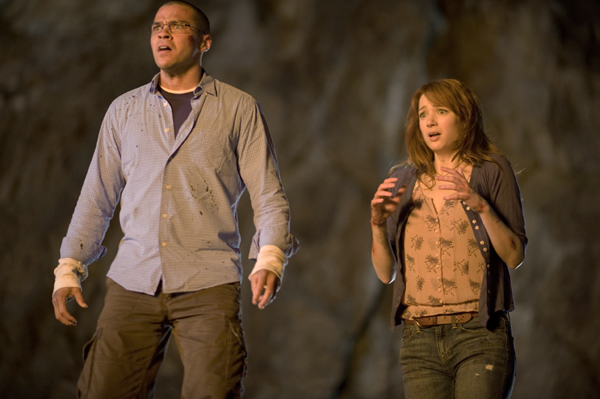
Jesse Williams and Kristen Connolly (Lionsgate/Diyah Pera)
Joss Whedon’s big Happy Meal tie-in extravaganza The Avengers will make a lot more money, but The Cabin in the Woods, his other film opening this spring, will almost certainly be a better use of his gifts. The film, which he co-wrote with the director, Cloverfield scribe Drew Goddard, uses one of the lowest of lowbrow genres, the backwoods slasher flick, as the setting for some knowingly smart-ass dialogue and sociological musings. It’s a slick, inventive, savvy piece of filmmaking.
How to describe The Cabin in the Woods? Imagine if Hellraiser took Wrong Turn out on a date and let Evil Dead II stay home to mind the kids. In many ways it’s like the perfect postmodern horror love note, or the greatest comic book convention movie of all time. And its joke at the expense of J-horror is probably worth the price of admission alone.
The film’s opening is generic enough that if you entered the theater late you might mistake it for the sort of movie it’s making fun of. Five college co-eds go off to spend a long weekend at a cousin’s place in the woods. On the way there, they’re warned off by a creepy old man at a ramshackle gas station, the kind of place where, instead of Snickers, the guy keeps jars of pickled animals near the counter. But they go ahead anyway. Once they get to the cabin, they awaken the usual sort of creepy backwoods evil that lurks in a setting like this.
Each co-ed appears to fit a type: Dana (Kristen Connolly) is the smart girl, whom we immediately know is our hero; Curt (Chris Hemsworth, the Avenger’s Thor), the jock; Jules (Anna Hutchison), the “free-spirited” blonde; Holden (Jesse Williams), the sensitive guy; and Marty (Whedon regular Fran Kranz), the stoner goof-off, introduced in one of the film’s worst jokes hot-boxing a jalopy with a four-foot-long bong. But it’s not really as simple as all that. Curt is actually an erudite sociology major (the film marks a modest milestone in American culture in which majoring in sociology is taken as some sign of depth), and Marty, who in general gets the film’s best lines, is the only one to realize that there’s something nefarious about the cabin.
But as the film progresses, each one moves closer to becoming a cliché, and the reason is not slack writing; it’s that they’re actually being secretly manipulated and observed by the employees of a mysterious underground office. I won’t reveal what they’re up to, but the bits with the two jaded upper-management types who run the facility, played by the perfectly cast Richard Jenkins and Bradley Whitford, are among the best in the film. Despite the loathsome evil of their enterprise, they fill up their time with the sort of banalities you’d find in a typical workplace, like in an episode of The Office set in H. P. Lovecraft’s Cthulhu mythos.
Without spoiling too much, I can say the smarty pants idea underpinning the whole thing is that horror movies are our contemporary outlet for human sacrifice. Where old-school Polynesians chucked virgins into volcanoes, Whedon and Goddard say we get our kicks watching movies where teens are butchered in the woods.
The observation is certainly clever, but it’s not terribly convincing, nor is it presented with the subtlety necessary for you to take it as anything but a kind of critical theory punch line. As a whole, the movie, enjoyable as it is, doesn’t actually hold up to too much scrutiny. There are plot holes you could pass a satellite through, but maybe I’m treating it a bit more seriously than the filmmakers probably mean for you to. In some ways, it’s probably best to think of the movie as the cinematic equivalent of those fancy organic candies you can buy at Whole Foods. In other words, it’s to ’70s and ’80s horror what a Newman’s Own peanut butter cup is to the Reese’s original. It tickles the same pleasure spots (sex, gore, laughs), but it has higher quality ingredients (Whedon’s zingers), and you get the feeling it’s probably better for you. But it’s probably not.
















Leave A Comment